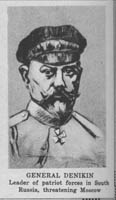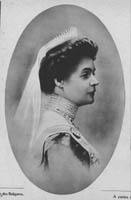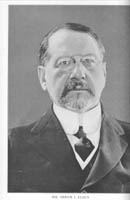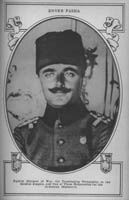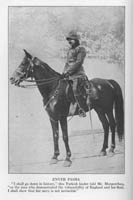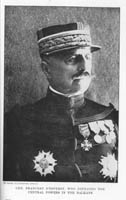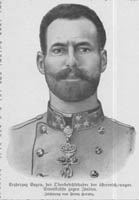Table of Contents
Key Figures
Statesmen
a | b | c | d-e | f | g | h-i | j-l | m | n-o | p | r | s | t-v | w-y
Anton Ivanovich Denikin (1872-1947)
A Russian general, Denikin rose to the rank of lieutenant general in the tsarist army during World War I. After the February Revolution in March 1917, Denikin became Chief of Staff to Mikhail Alekseyev of the Provisional Government and later became a commander on the Eastern Front. After the October Revolution in November 1917, Denikin fled to the Caucasus and joined with Lavr Kornilov to organize a White Russian army to fight the Bolsheviks. After the death of Kornilov in 1918, Denikin assumed command in the Ukrainian-South Russian Front of the Russian Civil War. In 1919, he established the South Russian government and received support from the French and the British. The Bolshevik First Cavalry Army, under General Simen Mikhailovich Budenny, defeated Denikin's Volunteer Army in November 1919, which forced Denikin to flee to Constantinople and exile. Denikin lived in France from 1926 to 1945 and then in the United States from 1945 to 1947.
Tsarina Eleonor of Bulgaria (1860-1917)
Eleonor was a German princess of Reuss and married Tsar Ferdinand I of Bulgaria in 1908 as his second wife. Eleonor strongly advocated welfare services in Bulgaria and supported War Prisoners' Aid operations for Allied POW's in Bulgaria during World War I.
Abram Isaac Elkus (1867-1947)
An American statesman, Elkus studied law at Columbia University and was admitted to the New York Bar Association in 1888. In 1910, the federal government appointed Elkus as a Special Assistant to the United States Attorney for the prosecution of bankruptcy fraud. The next year, he became the Counsel for the New York State Factory Investigating Committee and framed important legislation regarding child labor, working hours for women, fire protection, and other safety measures for factory workers. In 1912, Elkus was a New York state delegate at the Democratic National Convention which nominated Governor Woodrow Wilson for president. He became the Chairman of the Reconstruction Committee of New York State and presented a reorganization plan to Governor Alfred E. Smith. In 1916, President Wilson appointed Elkus as the United States Ambassador Extraordinary and Plenipotentiary to the Ottoman Empire, to replace Henry Morgenthau. As U.S. ambassador, Elkus represented the interests of a number of Allied countries, including Britain, France, Italy, Russia, and Belgium. Elkus strongly supported the work of the American YMCA in Constantinople and intervened on behalf of the organization with the Turkish government on a number of occasions. When the Turks imposed a new tax on the Association building and the police department expressed a strong interest in obtaining the facility, Elkus recommended that the Board of Managers shut down operations and lease the building to the Dutch government for POW relief operations. When John R. Mott visited Constantinople in August 1916 during one of his wartime visits to Europe, he met with Elkus to discuss the future of the Association in the Near East. When the United States declared war on Germany in April 1917, the State Department recalled Elkus, but a serious illness prevented his departure for several months. Governor Smith appointed Elkus as a Judge of the Court of Appeals in New York in November 1919 and he served on the bench until December 1920. He then accepted an appointment to serve as one of the commissioners to settle the Cland Islands dispute between Sweden and Finland.
Enver Pasha (Enver Bey) (1881-1922)
A Turkish nationalist, Enver Pasha was the leader of the Young Turk movement, dedicated to the reform and resurrection of the Turkish Empire. Enver Bey launched the revolt in Macedonia in 1908 which forced Sultan Abdul Hamid II to restore the constitution of 1876 and abdicate his throne. Enver Pasha fought against the Italians in Libya during the Tripolitan War of 1911-1912. During the negotiations at the end of the First Balkan War in January 1913, Enver Bey led the group which assassinated the Minister of War, Nazim Pasha, forced out the Grand Vizier, Kiamil Pasha, and made Sultan Mohammed V fill government posts with Young Turk leaders. After the murder of the Young Turk Grand Vizier, Mahmud Shevket, in June 1913, Enver Bey implemented the dismissal of all non-Young Turks from government positions. Enver Pasha became one of the triumvirate, with Kemal Pasha and Talaat Pasha, which ruled Turkey. In January 1914, Enver Pasha became the Minister of War and worked actively to align the empire with Germany. When the Ottoman Empire joined the Central Powers in November 1914, Enver Pasha exercised command over all of the Turkish armies, including the disastrous offensive against the Russians in the Caucasus. He was largely responsible for the Armenian atrocities in 1915. Despite his failure at large-scale strategy, Enver Pasha consolidated his political power and emerged as the absolute dictator of the empire. The British offensives in Palestine and Mesopotamia and the collapse of Bulgaria forced the resignation of the Young Turk government in October 1918 as the Ottomans signed an armistice. Enver Pasha escaped the country and traveled to Uzbekistan, where he tried to help the Uzbekis resist the Bolshevik Revolution. Enver Pasha died in 1922 fighting against the Red Army.
Franchet Louis-Felix-Marie-Francois d'Esperey (1856-1942)
A French field marshal, d'Esperey became a general of a brigade in 1908 and commanded a division by 1912. During Ludendorff's Spring Offensive of 1918, he was defeated at Aisne (May 1918). His prospects improved when the French High Command sent him to command the Allied forces at Salonika. He launched a major offensive in Macedonia and overwhelmed the German and Bulgarian defenders in September 1918. This action resulted in the liberation of Serbia and the collapse of Bulgaria in October 1918. Allied forces drove on to the Danube and Austria-Hungary signed an armistice in early November. In 1921, the French government promoted d'Esperey to the rank of marshal of France.
Archduke Eugene of Austria (1863-1954)
Eugene rose to the rank of Field Marshal for his service to the Dual Monarchy during World War I. In December 1914, he replaced General Oskar Potiorek as the Commander-in-Chief of Austro-Hungarian forces in the Balkans. With Italy's entry into the war on the side of the Allies in May 1915, Eugene commanded the Southwestern Front and countered General Luigi Cadorna's series of assaults on the Isonzo Front. The combined Austro-German armies achieved a major victory in October 1917 when the Central Powers occupied Venetia and forced the Italians to retreat to the Piave River in the Battle of Caporetto. Eugene commanded Austrian forces in Italy until the end of the war.
